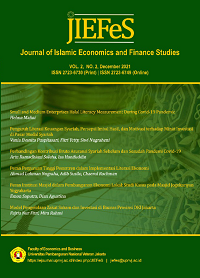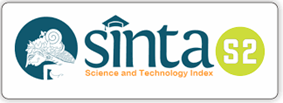Peran Perguruan Tinggi Pesantren dalam Implementasi Literasi Ekonomi
DOI:
https://doi.org/10.47700/jiefes.v2i2.3552Keywords:
Ekonomi Islam, Literasi Ekonomi, Perilaku Konsumsi, Perguruan Tinggi, PesantrenAbstract
Abstract
This study aims to determine the role of Islamic boarding schools in the application of economic literacy. The research method used is descriptive qualitative. The object of this research is Darussalam Gontor University. The results of this study indicate that Islamic boarding schools in implementing economic literacy carry out several functions; 1) as an educational institution that changes the economic orientation of the community which was originally intended to satisfy wants, to become "sufficient" by meeting needs, 2) as an educational institution that changes a consumptive lifestyle into a moderate lifestyle, 3) as an educational institution that frames human economic activities in the framework of ta'abbudi (worship) which was originally limited to the framework of meeting physical needs, 4) as an educational institution that changes its profit and utility orientation, to an orientation to maximize maslahah, 5) as an educational institution that applies forced learning methods, and finally could be because they are used to it, 6) as an educational institution that applies economic literacy not limited to academic aspects, but non-academic aspects.
Abstrak
Penelitian ini bertujuan untuk mengetahui peran universitas pesantren dalam penerapan literasi ekonomi. Metode penelitian yang digunakan adalah deskriptif kualitatif. Objek penelitian ini adalah Universitas Darussalam Gontor. Hasil penelitian ini menunjukkan bahwa universitas pesantren dalam pelaksanaan literasi ekonomi menjalankan beberapa fungsi; 1) sebagai lembaga pendidikan yang mengubah orientasi ekonomi masyarakat yang semula dimaksudkan untuk memuaskan keinginan, menjadi "cukup" dengan memenuhi kebutuhan, 2) sebagai institusi pendidikan yang mengubah gaya hidup konsumtif menjadi gaya hidup moderat, 3) sebagai lembaga pendidikan yang membingkai kegiatan ekonomi manusia modern dalam kerangka ta'abbudi (ibadah) yang semula terbatas pada kerangka pemenuhan kebutuhan fisik, 4) sebagai lembaga pendidikan yang mengubah orientasi berorientasi keuntungan dan utilitas, menjadi orientasi memaksimalkan maslahah, 5) sebagai institusi pendidikan yang menerapkan metode pembelajaran secara paksa, dan akhirnya bisa karena mereka sudah terbiasa, 6) sebagai lembaga pendidikan yang menerapkan literasi ekonomi tidak terbatas pada aspek akademik, tetapi aspek non-akademik.
References
Agusta, I. (2003). Teknik Pengumpulan dan Analisis Data Kualitatif. Litbang Pertanian.
Amalia, Y. (2017). Pengaruh hedonic shopping motivations dan faktor demografis terhadap impulsive buying pengunjung Mal [UIN Syarif Hidayatullah]. http://103.229.202.68/dspace/handle/123456789/36977
Amelia, P. (2018). Tingkat Literasi Ekonomi di Kalangan Pengusaha Mikro Kecil di Kecamatan Kota Gede Yogyakarta. Universitas Sanata Dharma.
Badan Pengembangan dan Pembinaan Bahasa. (2017). KAMUS BESAR BAHASA INDONESIA (KBBI) (5th ed.). BADAN PENGEMBANGAN DAN PEMBINAAN BAHASA KEMDIKBUD.
Basyit, A. (2017). Pembaharuan Model Pesantren: Respon Terhadap Modernitas. Kordinat | Jurnal Komunikasi Antar Perguruan Tinggi Agama Islam, 16(2). https://doi.org/https://doi.org/10.15408/kordinat.v16i2.6444
Hamzah, S. H. (2014). Perkembangan Pesantren di Indonesia (Era Orde Lama, Orde Baru, Reformasi). SYAMIL: Jurnal Pendidikan Agama Islam (Journal of Islamic Education), 2(1), 14. https://doi.org/10.21093/sy.v2i1.490
Heriyudanta, M. (2016). Modernisasi Pendidikan Pesantren Perspektif Azyumardi Azra. MUDARRISA: Jurnal Kajian Pendidikan Islam, 8(1). https://doi.org/https://doi.org/10.18326/mdr.v8i1.145-172
Huda, M. (2020). Interview.
Jappelli, T. (2010). Economic Literacy: An International Comparison. The Economic Journal, 120(548), F429–F451. https://doi.org/10.1111/j.1468-0297.2010.02397.x
Kholili, H. (2012). Pondok Pesantren Dan Pengembangan Potensi Dakwah. Jurnal Dakwah, 13(2).
Khomsiyatun, U. (2018). Pembelajaran Kreatif Berbasis Literasi Bahasa Menumbuhkan Anak yang Cerdas dan Kreatif. INSANIA : Jurnal Pemikiran Alternatif Kependidikan, 23(2). https://doi.org/https://doi.org/10.24090/insania.v23i2
Kusniawati, M. (2016). Pengaruh status sosial ekonomi orang tua dan literasi ekonomi terhadap perilaku konsumsi siswa kelas X IPS di SMA Negeri 2 Tuban. Jurnal Pendidikan Ekonomi (JUPE), 4(3).
Ma’arif, S. (2011). DINAMIKA PESANTREN KONTEMPORER. Millah, 11(1), 29–49. https://doi.org/10.20885/millah.vol11.iss1.art2
Margaretha, F., & Pambudhi, R. A. (2015). Tingkat Literasi Keuangan Pada Mahasiswa S-1 Fakultas Ekonomi. Jurnal Manajemen Dan Kewirausahaan, 17(1).
Mastuhu. (1994). Dinamika Sistem Pendidikan Pesantren. INIS.
Mathews, A. J., Chute, A., & Cameron, C. A. (1986). Meeting the Literacy Challenge: A Federal Perspective.
Miller, J. W., & McKenna, M. C. (2016). World Literacy (1st ed.). Routledge. https://doi.org/10.4324/9781315693934
Moleong, L. J. (1989). Metodologi Penelitian Kualitatif. Remaja Rosda Karya.
Nugraha, A. L. (2018). Islamic Business Ethics and Islamic Microfinance in Pesantren Gontor. Shirkah: Journal of Economics and Business, 2(1). https://doi.org/10.22515/shirkah.v2i1.28
Nugraha, A. L., Sunjoto, A. R., & Susilo, A. (2019). Signifikansi Penerapan Literasi Ekonomi Islam di Perguruan Tinggi: Kajian Teoritis. Islamic Economics Journal, 5(1), 143–162.
Padmarini, R. R. U. (2002). Dampak Pemberlakuan Ecolabelling oleh Negara-negara Maju Terhadap Ekspor Indonesia [Universitas Airlangga]. http://repository.unair.ac.id/46804/
Prayogo, S. (2020). Indonesia Krisis Literasi. 26 July. https://www.bukabaca.id/indonesia-krisis-literasi/
Priyatna, M. (2017). Manajemen Pembelajaran Program Kulliyatul Mu’allimin al-Islamiyah (KMI) di Pondok Pesantren Modern al-Ihsan Baleendah Bandung. Edukasi Islami : Jurnal Pendidikan Islam, 6(11), 22. https://doi.org/10.30868/ei.v6i11.93
Puspita, G. A., & Irwansyah, I. (2018). Pergeseran Budaya Baca dan Perkembangan Industri Penerbitan Buku di Indonesia: Studi Kasus Pembaca E-Book Melalui Aplikasi iPusnas. BIBLIOTIKA : Jurnal Kajian Perpustakaan Dan Informasi, 2(1), 13–20. https://doi.org/10.17977/um008v2i12018p013
Reder, S. (2010). Adult Literacy Development and Economic Growth. https://files.eric.ed.gov/fulltext/ED512441.pdf
Rizal, A., Fauziyah, N. E., Ma’ruf, A., & Susilo, A. (2020). Integrating Zakah and Waqf for Developing Islamic Economic Boarding School (IEBS) Project in Indonesia. Journal of Islamic Economics and Philanthropy, 3(2). https://doi.org/10.21111/jiep.v3i02.4577
Romdhoni, A. (2013). Al-Qur’an dan Literasi: Sejarah Rancang-Bangun Ilmu-ilmu Keislaman. Literatur Nusantara.
Sahal, H. A. (2019). Pidato Pekan Perkenalan Universitas Darussalam Gontor. Gontor.
Saifudin, M. F., & Safitri, I. A. (2015). Optimalisasi Pembelajaran Bahasa Indonesia Melalui Budaya Literasi di Sekolah Dasar.
Sina, P. G. (2012). Analisis Literasi Ekonomi. Jurnal Economia, 8(5).
Stern, G. H. (2002). Economic literacy leads to better grasp of public policy issues. The Region, Federal Reserve Bank of Minneapolis, 16, 2–5.
Sugrue, M. (2017). Literacy, Language, and Learning (L3) Initiative. U.S. Agency for International Development. https://www.edc.org/literacy-language-and-learning-l3-initiative#challenge
Susilo, A. (2016). Kontribusi Waqf Gontor Terhadap Kesejahteraan Masyarakat Desa Gontor. Islamic Economics Journal, 2(1). https://doi.org/10.21111/iej.v2i1.967
Syamsuri. (2020). Interview.
Literacy Rates Continue to Rise from One Generation to the Next, Pub. L. No. FS/2017/LIT/45 (2017). http://uis.unesco.org/sites/default/files/documents/fs45-literacy-rates-continue-rise-generation-to-next-en-2017.pdf
Toni, H. (2016). Pesantren Sebagai Potensi Pengembangan Dakwah Islam. Jurnal Dakwah Dan Komunikasi, 1(1).
Umam, K. (2020). Interview.
Universitas Darussalam Gontor. (2018a). History of UNIDA Gontor. UNIDA Gontor. http://unida.gontor.ac.id/history/#top
Universitas Darussalam Gontor. (2018b). Undergraduate Program. UNIDA Gontor.
Universitas Darussalam Gontor. (2018c). Visi, Misi, & Tujuan. UNIDA Gontor. http://unida.gontor.ac.id/visi-misi-tujuan/
Zarkasyi, A. F. (1998). Pondok Pesantren sebagai Lembaga Pendidikan dan Dakwah. In A. Sasono, D. Hafidhuddin, & A. M. Saefuddin (Eds.), Solusi Islam atas problematika umat : ekonomi, pendidikan, dan dakwah. Gema Insani Pers.
Zarkasyi, A. F. (2019). Pidato Pekan Perkenalan Universitas Darussalam Gontor. Gontor.
Zarkasyi, H. F., Lahuri, S., Umam, K., & Cahyo, E. N. (2016). Curriculum Design of Master Program on Islamic Economics in Indonesian, Pakistan, Turkish, and Malaysian Universities. TSAQAFAH Journal of Islamic Civilization, 12(1).
Downloads
Published
Issue
Section
License
Authors who publish with this journal agree to the following terms:
- Authors retain copyright and grant the journal right of first publication with the work simultaneously licensed under a Creative Commons Attribution 4.0 International License that allows others to share the work with an acknowledgment of the work's authorship and initial publication in this journal.
- Authors can enter into separate, additional contractual arrangements for the non-exclusive distribution of the journal's published version of the work (e.g., post it to an institutional repository or publish it in a book), with an acknowledgment of its initial publication in this journal.
- Authors are permitted and encouraged to post their work online (e.g., in institutional repositories or on their website) before and during the submission process, as it can lead to productive exchanges, as well as earlier and greater citation of published work.

This work is licensed under a Creative Commons Attribution 4.0 International License.











